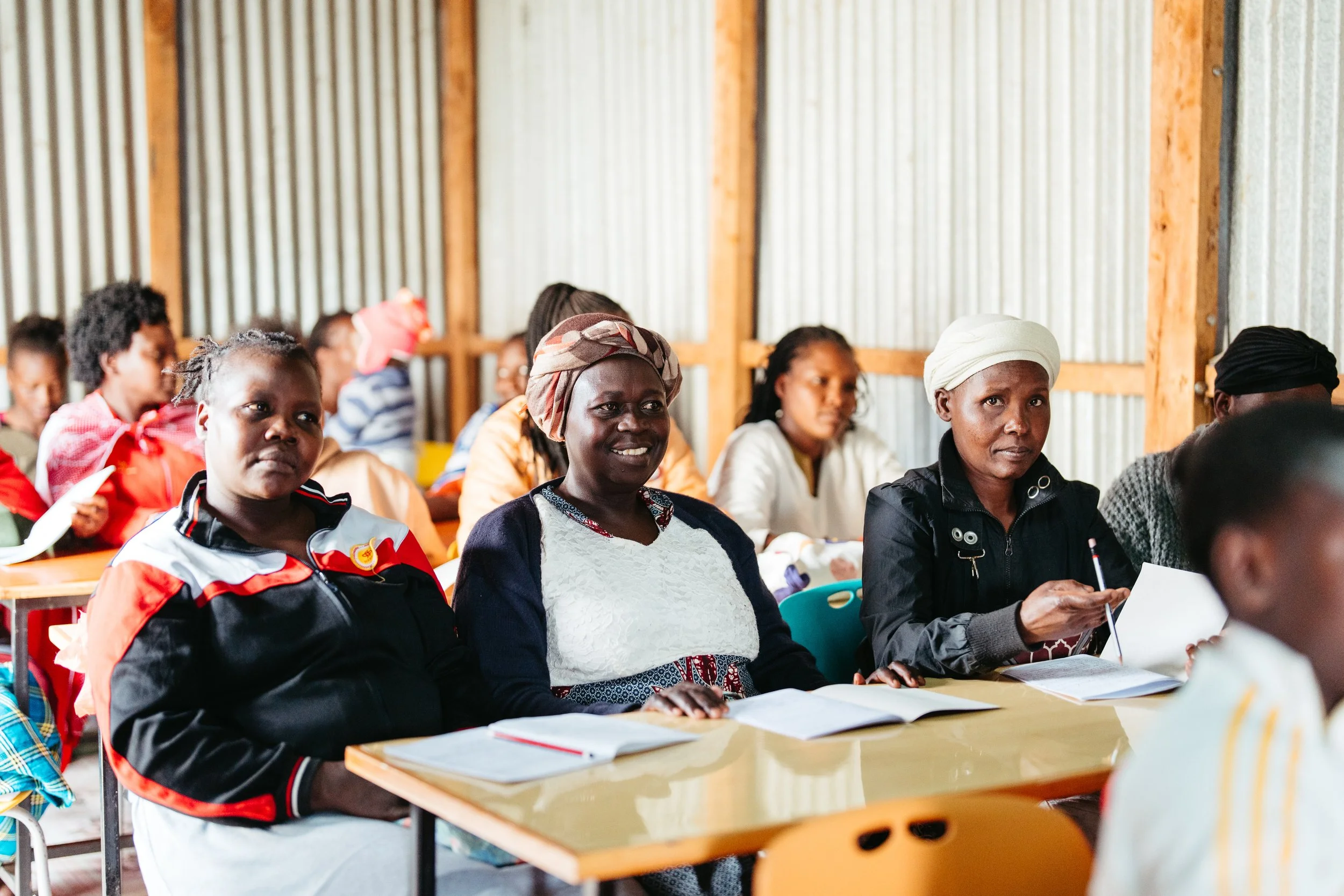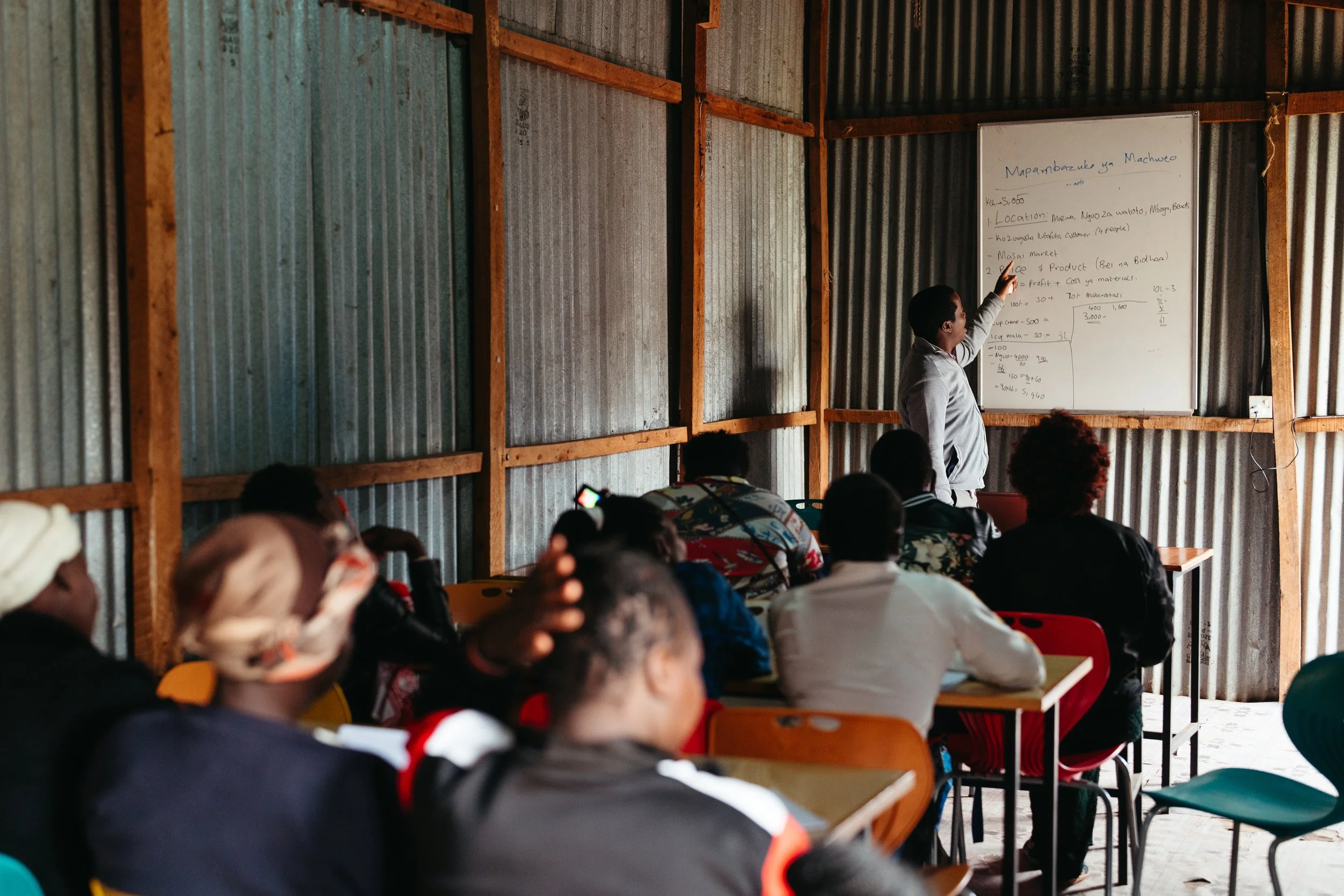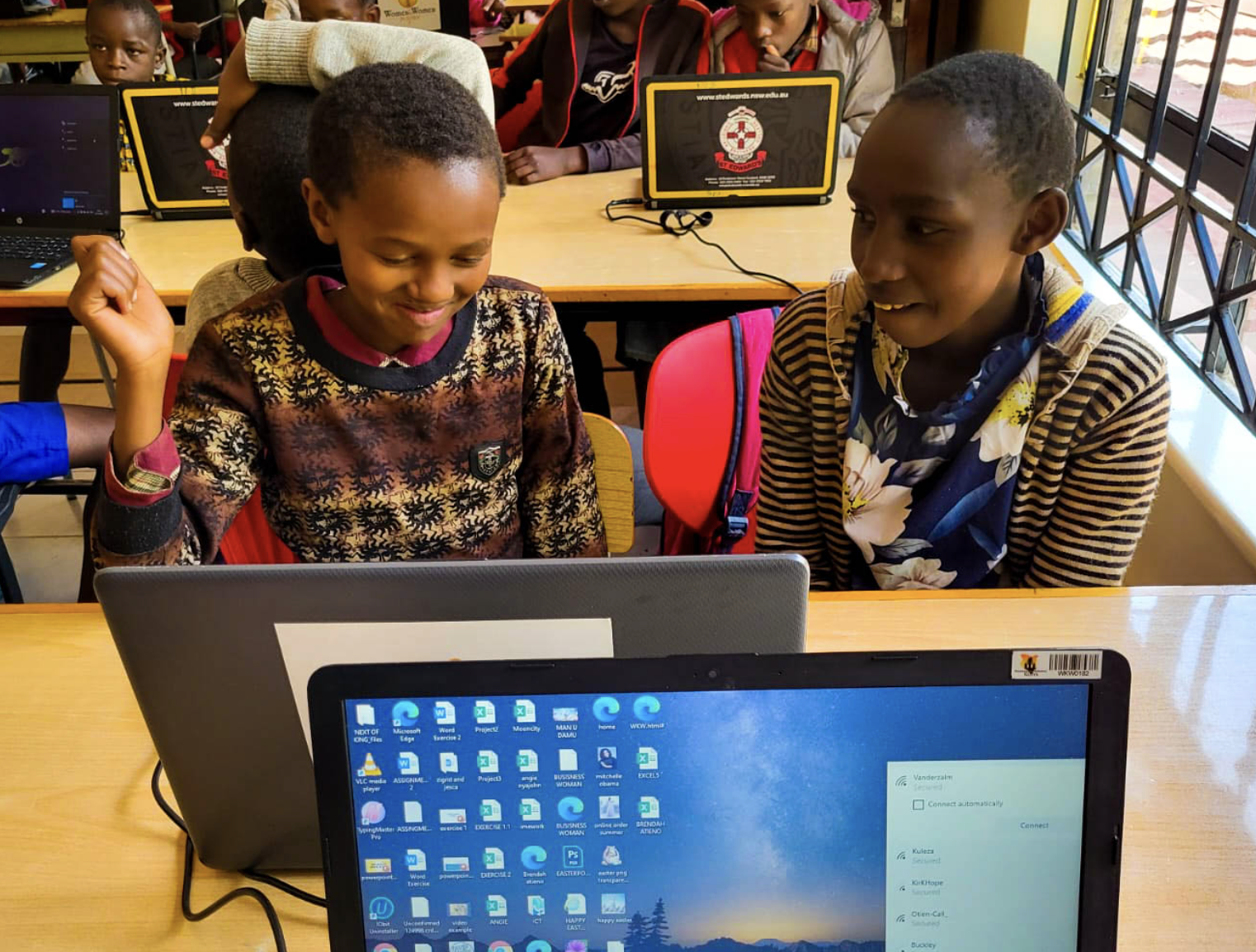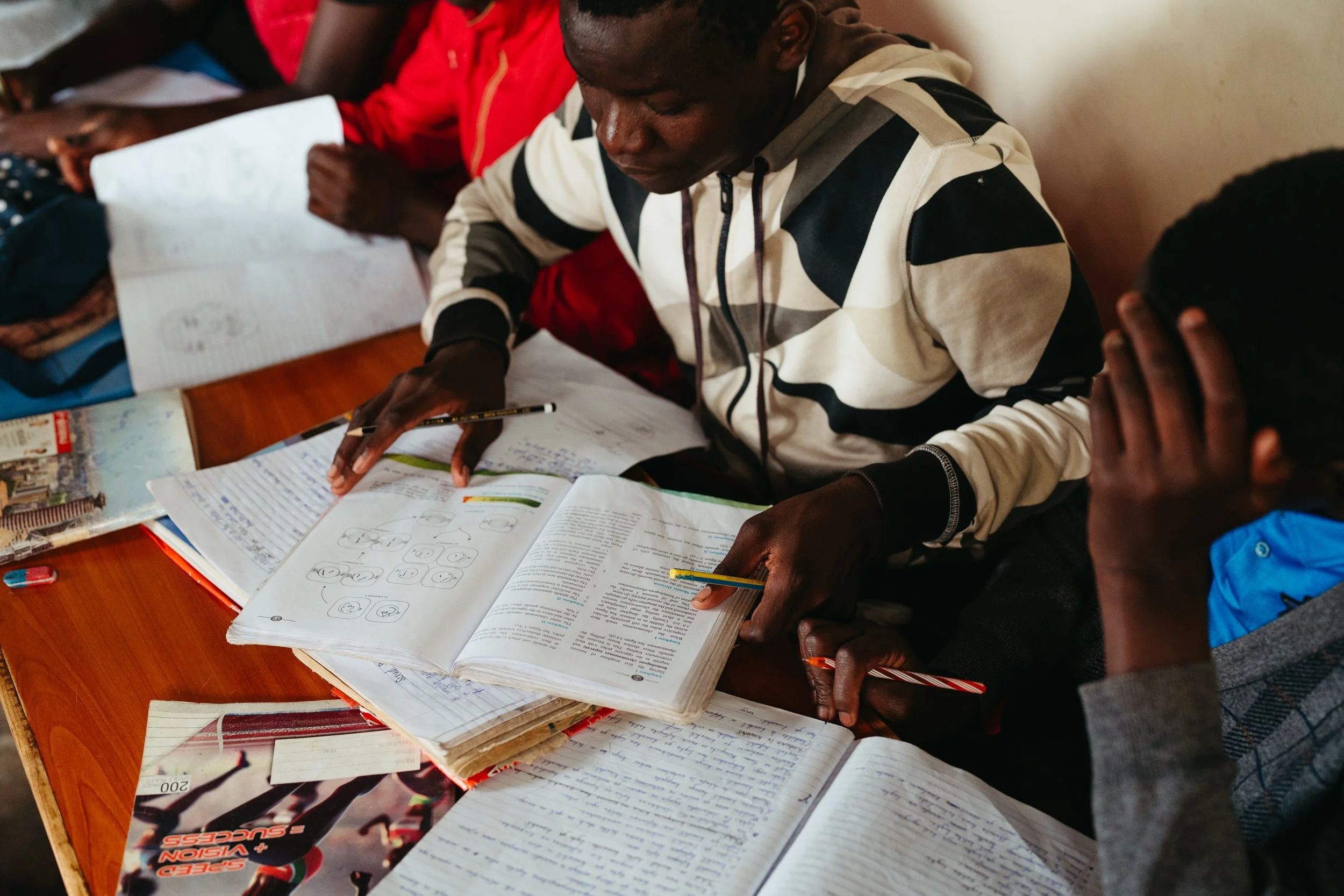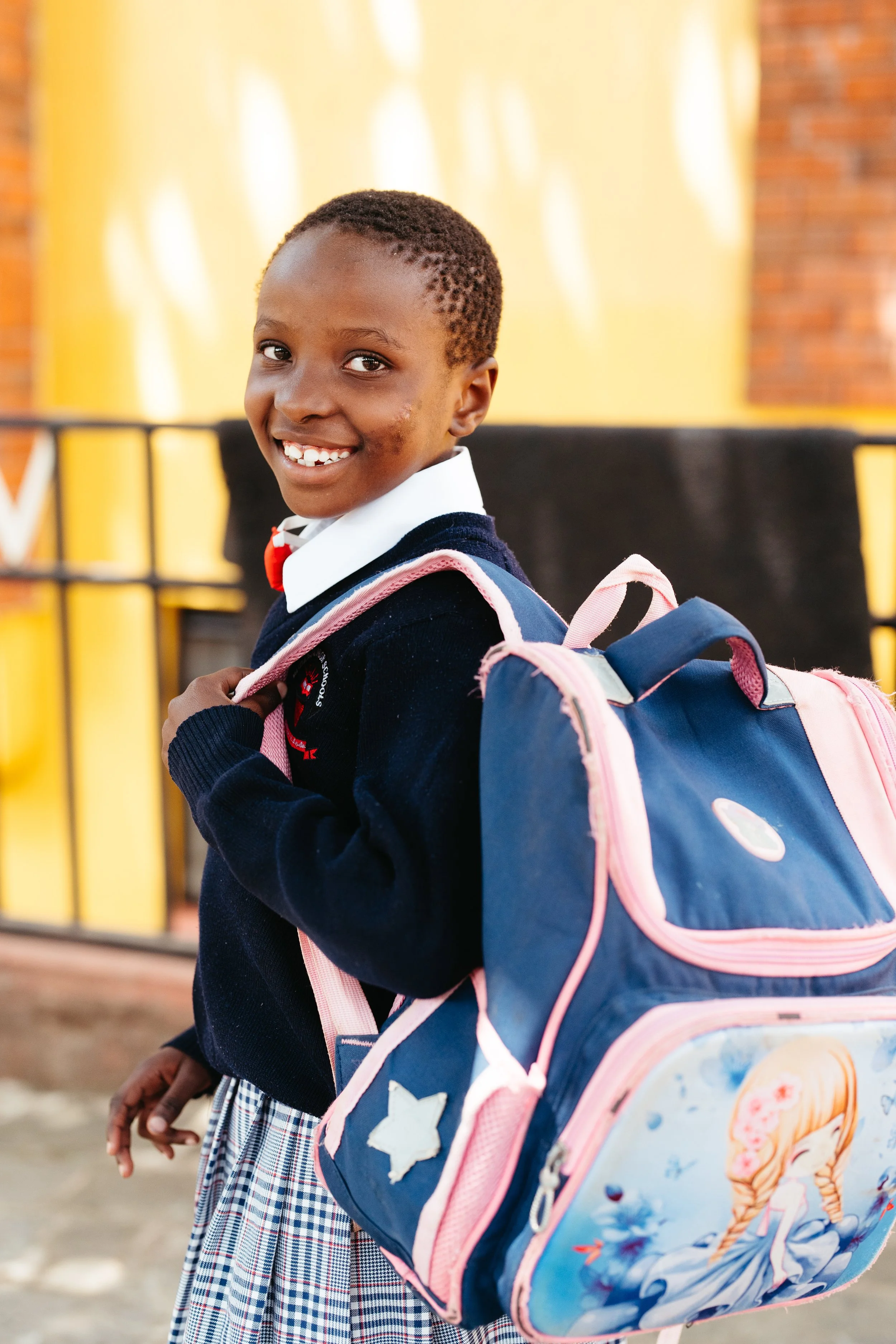Women for Women in Africa (WFWIA) is run entirely by volunteers in Australia. We proudly fund and support Wanawake kwa Wanawake (WkW)—our trusted on-the-ground partner in Kibera, Nairobi.
WkW manages all programs and properties, delivering life-changing support to over 340 women and 330 students through its vibrant community centre. A dedicated local team facilitates these programs in partnership with trusted institutions and grassroots partners. While most of the Women’s programs currently run without funding, we are grateful for Victory Funding (Melbourne) who supports the Table Banking initiative.
Skills Training for Women
Offered twice a year in partnership with Kibondeni College, our training courses are:
10–12 weeks in duration
2 hours per session
Free of charge to all students
Supported with all learning materials and six months of post-training guidance
Courses are designed to build skills, confidence, and pathways to employment. Every graduate receives tailored follow-up support, ensuring a smooth transition into work or further training.
Each program cycle ends with a joyful Graduation Ceremony at the WkW Centre—a powerful moment of pride and celebration for students and their families.
We are proud to share that our women’s programs have achieved 100% attendance and completion rates to date—an inspiring reflection of the determination and drive within the Kibera community.
OUR PROGRAMS
BuildHer
-
Aim:
To empower young women—especially mothers—with trade skills that lead to well-paid employment, gender equity in the workforce, and long-term economic independence.About:
BuildHer is a cutting-edge vocational training initiative designed to close the gender wage gap in traditionally male-dominated industries. Through practical, hands-on training in painting, tiling, and carpentry, women gain the skills and confidence to enter the construction and trade sectors as equals.What sets BuildHer apart is its commitment to workforce equity:
Graduates earn the same wages as their male counterparts, breaking down entrenched gender barriers and redefining the role of women in Kenya’s labour force.
This program not only transforms the lives of women but also uplifts families and communities across Kibera. Through structured training, strategic partnerships, and post-program support, BuildHer ensures sustainable impact well beyond the classroom.
Positive Outcomes:
Industry-level skills in painting, tiling, and carpentry
Equal pay for equal work—graduates earn the same as men
Increased self-confidence, dignity, and economic independence
Reduced reliance on informal or unsafe work
Empowered women become role models in their community
Families experience improved living standards
Challenges & Innovation:
While challenges such as societal resistance and limited funding exist, BuildHer tackles them through advocacy, community engagement, and a strong support network that includes local stakeholders and employment partners.This is more than training—it’s a movement toward equity, empowerment, and change.
Digital Literacy
-
Aim:
To empower women with essential digital skills, bridging the digital literacy gap and preparing them for income generation and community engagement in today’s connected world.About:
Delivered in partnership with Nairobits, who provides the trainer and 20 iPhones for student use, this 12-week course equips women with practical digital knowledge to support their personal and professional growth.The program covers three competency levels—Basic, Intermediate, and Advanced—using the Skills for Inclusive Digital Participation framework. Women learn how to navigate digital tools confidently, including essential skills like online banking, mobile payments, and communication apps.
Key Focus Areas:
Entrepreneurship and Income Generation: Equip women with digital tools and know-how to access business opportunities online and offline, enabling them to start or grow their own small businesses.
Community Engagement: Enable participants to use digital platforms to access services, educate others, and raise awareness on important issues within their communities.
Positive Outcomes:
Competence in using smartphones and digital applications
Ability to manage online banking and phone payments safely
Skills to promote and operate small businesses digitally
Enhanced communication and community advocacy through digital platforms
Increased confidence in navigating the digital world and an opportunity to bridge the inequity of life in Kibera.
Girls Who Code
-
About:
Launched in 2025 at WkW, Girls Who Code is an exciting new program designed to inspire and empower primary school children in Kibera by teaching them essential coding and computer science skills. For many participants, this is their first-ever opportunity to interact directly with computers, as most do not have access to technology at home or school. This initiative aims to close the gender gap in technology by providing a supportive, hands-on learning environment where young students can explore creativity, problem-solving, and digital innovation.Building on a global model known for fostering confidence and leadership in girls, the program will soon extend to secondary school students, expanding opportunities for young women to thrive in the tech world.
Aims:
To spark interest and passion for coding and technology among children in Kibera
To build foundational computer science skills through interactive, project-based learning
To nurture problem-solving, collaboration, and critical thinking abilities
To empower students to see themselves as future leaders and innovators in tech industries
Positive Outcomes:
Increased digital literacy and coding skills among participants
Enhanced confidence and motivation to pursue STEM education and careers
Development of teamwork and creative problem-solving capabilities
Creation of a supportive community of young minds passionate about technology
Pathways to further education and employment opportunities in digital fields
WkW’s Girls Who Code program is more than coding—it’s about opening doors, breaking barriers, and shaping the future leaders of Kenya’s digital economy.
Street MBA
-
Aim:
To equip women from diverse cultural backgrounds with essential life skills, financial literacy, and entrepreneurial knowledge—laying the foundation for self-employment, job readiness, and long-term financial independence.About:
The Street MBA is the final step in the women’s training journey—where confidence, skills, and self-agency truly come together. Launched in 2021 and run in partnership with Eastlands College of Technology, this program welcomes women from all WkW groups, including the Maasai, Ugandan, and Utizu groups, creating a dynamic and inclusive learning environment.With classes of approximately 20 women, the Street MBA introduces students—many for the first time—to structured, competency-based education focused on:
Life skills
Financial literacy
Entrepreneurship basics
Held at the WkW Centre, the program is a powerful blend of theory and practice. It empowers participants to turn their newly acquired vocational skills into sustainable income through small businesses or gainful employment.
Graduates emerge with:
Financial independence
Increased confidence and personal agency
Business acumen to launch and manage microenterprises
Practical tools to support budgeting, saving, and investment
The ability to lift themselves—and their families—out of poverty
Ongoing Support:
To ensure lasting impact, the WkW team conducts regular outreach and home visits over six months after graduation. These evaluations help track outcomes, provide mentorship, and ensure the theory aligns with real-world results.The Street MBA is not just a class—it’s a launchpad to freedom, dignity, and opportunity.
Basic Literacy
-
Aim:
To provide foundational literacy skills tailored to each woman’s individual learning needs, empowering those with little or no formal education to gain independence and confidence.About:
Led by a facilitator from Eastlands College, this 12-week practical, competency-based program is carefully scaffolded to meet participants learning needs. The course progressively builds skills, enabling women to confidently complete forms, read signs, and engage more fully in their communities.Positive Outcomes:
Literacy skills developed step-by-step, tailored to individual needs
Ability to write names and basic personal information
Competence in reading everyday signs and documents
Increased confidence and motivation to continue learning
Foundation for participation in further training programs
Greater independence in daily life and decision-making
Victory Table Banking
-
About
Victory Table Banking is the only women’s program with corporate funding, generously supported by Victory Funding in Melbourne since 2024 for a three-year period. This self-managed program operates through four groups of women, promoting financial independence, confidence, and community strength.Aim:
To empower women through financial literacy and microfinance, enabling them to save, borrow, and invest in small businesses, fostering economic resilience and social cohesion.How it Works:
Each woman contributes a weekly savings amount according to her means.
The pooled money accrues interest and is loaned out to participants at 10% interest, repayable within a month.
At year’s end, participants receive their original savings plus a share of the interest profits.
An emergency fund is maintained for crisis situations, which does not require repayment.
Positive Outcomes:
Increased financial independence and money management skills
Opportunities for women to start or expand small businesses
Strengthened social bonds and mutual support among group members
Creation of a safety net through the emergency fund for unforeseen challenges
Growing reputation and sustainability within the community
Victory Funding’s backing has been instrumental in enabling many women to achieve economic empowerment and contribute to their families and communities.
Basic Cookery and Housekeeping Skills Program
-
Aim:
To equip women with practical cookery and housekeeping skills that meet hospitality and home care industry standards—empowering them to secure employment and improve their household environments.Facilitator:
Miss Victoria NyambuIt (Kibondeni College)Overview:
This foundational program provides hands-on training in safe food handling, basic cooking techniques, hygiene, and professional housekeeping practices. Participants learn both theory and applied skills aligned with Occupational Health and Safety (OH&S) standards.The course not only prepares women for employment in the hospitality or domestic work sectors but also improves wellbeing within their own homes and communities.
Positive Outcomes:
Enhanced personal hygiene and pride in appearance
Increased job-readiness and practical hospitality skills
Boost in self-confidence and self-worth
Recognition and appreciation from families and peers
Greater motivation to pursue further training or job opportunities
Primary and Secondary Sponsorship Program
-
Aim:
To provide vulnerable children in Kibera with access to quality education through individual sponsorship—breaking the cycle of poverty and creating pathways to a brighter future.Education is the Key to Change
In Kibera, access to education is out of reach for many children due to poverty, school fees, and systemic barriers. Women for Women in Africa believes every child deserves a chance to learn, grow, and create a better future. Our Sponsorship Program connects Australian donors with students in need, giving them the opportunity to attend school and receive holistic support.
The Kenyan School System
In 2023, Kenya transitioned to a 6-6 system:
Primary School: 6 years (plus 2 years optional preschool)
Junior Secondary: Years 7–9
Senior Secondary: Years 10–12
Students attend school from 8am to 4:30pm, with three terms annually (January–December). National exams in Year 6 and Year 12 determine school or tertiary placement. However, many families in Kibera cannot afford the fees—especially for secondary or boarding school—and children often miss out on education entirely without sponsorship.
Overview:
In Kibera, the cost of school fees, uniforms, books, and basic supplies keeps many children out of the classroom. Our Sponsorship Program connects generous Australian donors with students in need, enabling them to attend school, learn in a safe environment, and thrive academically and personally.Each sponsorship covers:
School fees (primary or secondary level)
Uniforms, shoes, and school supplies
Bedding and healthcare
Transport and boarding fees (for those placed in boarding schools)
Beyond financial support, our local WkW team provides wraparound care—working closely with families, schools, and each child to ensure lasting success. Students are also encouraged to write to their sponsors, sharing their progress and building meaningful, long-term connections.
Positive Outcomes:
Hundreds of students have graduated and moved on to higher education or employment
Children are learning in safe, structured, and supportive environments
Students build self-confidence, discipline, and resilience
Strong personal connections between sponsors and students boost motivation and hope
Families gain relief and renewed optimism for the future
Education helps protect vulnerable girls from early pregnancy, child labour, and exploitation
You Can Help:
Becoming a sponsor is more than a donation—it’s an investment in a child’s life and a community’s future. Sponsor a student today and help unlock the power of education in Kibera.
Tertiary Sponsorship Program
-
Empowering the Next Generation of Leaders
For students in Kibera, completing secondary school is an incredible achievement—but without further education, their dreams remain just out of reach. At Women for Women in Africa, we believe every ambitious student deserves the chance to go further.
Our Tertiary Sponsorship Program opens the door to university, college, and vocational training, giving young people the tools they need to find meaningful work, achieve independence, and break the cycle of poverty for good.
Why Tertiary Support Matters
In Kenya, post-secondary education is expensive—up to three times the cost of secondary school. There is a range in fees from a certificate course to a degree, which can range from $2,000 to $5,000 with the average cost of a three-year diploma is $3,500–$4,500 AUD per year, far beyond what families in Kibera can afford. With youth unemployment at 65%, access to quality training and credentials is essential to creating real opportunities.
Since 2010, our program has helped students pursue further education that leads to employment, self-reliance, and long-term community impact.
How the Program Works
Course Placement: After finishing Year 12, students wait 8–9 months for course placement from the Kenyan government, based on national exam results.
The GAP year is a time when secondary school graduates wait for a Tertiary placement.
Gap Year Support: During this time, WkW provides:
Volunteering opportunities at the WkW Centre
Short courses in ICT, personal safety, financial literacy, and life skills which help bridge the digital divide.
Career guidance and emotional support
This extensive training for students is currently unfunded,
Ongoing Communication: Students continue writing to their sponsors throughout the gap year, maintaining meaningful personal connections.
Our Educational Partners
We work closely with trusted institutions that not only educate but also support graduates into employment:
Kibondeni College – Catering & Hospitality
Eastlands College – Technical & Vocational Skills
These partnerships help ensure our students are workforce-ready and positioned for success.
Positive Outcomes
Access to accredited university, college, and trade schools
Pathways to employment, financial security, and independent living
High retention and graduation rates thanks to strong student motivation
Ongoing support from the WkW team and sponsors
Graduates often remain in Nairobi, contributing their skills back to the local economy
[Insert number of students supported to date and graduate success stories]
Looking Ahead
From 2024, some unsponsored students became beneficiaries of the JMH Scholarship Fund. In 2025, the Maguerite Ryan (AM) was launched for one student. The Loretta Brennan Tertiary Scholarship Fund was established as tribute to her legacy of her contribution to WkW and work in East Africa over the past 26 years. Seven students will be beneficiaries of this fund.
We aim to expand with new corporate or individual scholarships—a chance to create a perpetual tertiary education fund that transforms futures for generations.
Be the Bridge to a Brighter Future
Becoming a tertiary sponsor means more than funding education—it means mentoring, believing, and changing a life. Help a student reach their full potential and step into a future filled with dignity, purpose, and hope.

